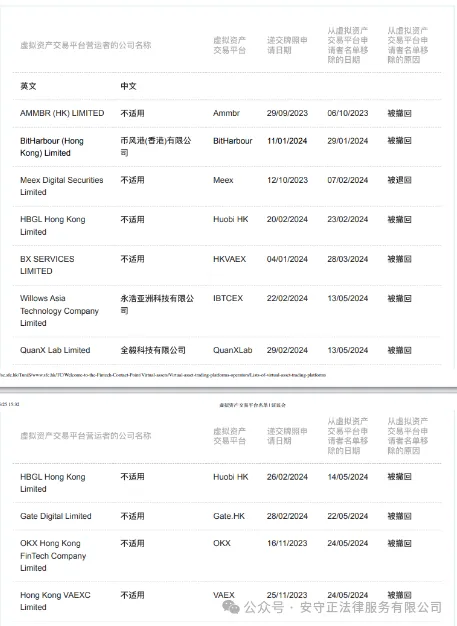Currently, only two platforms have obtained licenses from the China Securities Regulatory Commission, while 18 are in the process of applying.
Author: Anshuzheng Law Firm
Multiple Platforms Withdraw License Applications in Hong Kong
On May 26, according to Ming Pao, the transitional period for the licensing of Virtual Asset Service Providers (VASPs) in Hong Kong will end at the end of this month, and the Securities and Futures Commission will decide whether existing service providers can continue to operate. Recently, multiple platforms including OKX and VAEX have withdrawn their license applications (see specific list in the image below). The reason is that compliance costs in Hong Kong are high, and the local market is less attractive. Industry insiders believe that the lack of liquidity and trading currencies compared to overseas, as well as strict regulatory conditions in Hong Kong, are the reasons for the platforms withdrawing their license applications.

Currently, only two platforms have obtained licenses from the China Securities Regulatory Commission, while 18 are in the process of applying. Industry experts suggest strengthening the tokenization of virtual assets in real-world applications to increase market acceptance and practical use. Regardless of the background of these withdrawn applicants, let's take a look at the situation of the platforms that have obtained licenses.
1. OSL
It is the first platform in Hong Kong to obtain a license, backed by BC Technology, Fidelity Investments, and GIC of Singapore.
OSL was founded in 2018, and at that time, the digital asset trading platform OSL was established within the Hong Kong-listed company "Brand China." In 2019, the company was renamed "BC Technology (http://00863.HK)." In December 2020, OSL obtained the first securities trading license and the seventh automated trading license issued by the Securities and Futures Commission of Hong Kong, providing digital asset trading services to professional investors in the Asia-Pacific region. In the following years, OSL also obtained virtual asset licenses 4 & 9. Its current business includes SAAS, brokerage, exchange, and custody services, serving professional institutions and retail investors. On August 3, 2023, BC Technology, the parent company of OSL, announced that its wholly-owned subsidiary OSL had been approved by the Securities and Futures Commission of Hong Kong to upgrade its existing license, officially providing digital asset trading services for mainstream currencies such as Bitcoin and Ethereum to retail investors.
2. Hashkey
The founder of Hashkey is Xiao Feng, who provided significant support for Ethereum when it entered China in the early years and is also known as a leader in Ethereum in China. In recent years, its parent company, Wanxiang Group, has been well-known in China, and CEO Deng Chao was an early member of Wanxiang, while COO Weng Xiaoqi was the global CEO of Huobi during the Li Lin era. Its business includes exchanges, brokerage, venture capital, Web3 infrastructure services, and technology services, serving institutions, family offices, funds, and professional qualified investors. The Hashkey Exchange business is a "one-stop" service.
3. HKVAX
The three co-founders of HKVAX are CEO Wu Weiliang, COO Huo Zhaoliang, and CTO Liu Cheng. The first two are local practitioners in Hong Kong, and the CTO comes from the internet giant Ant Group. CEO Wu Weiliang and COO Huo Zhaoliang previously served as CEO and compliance officer, respectively, of the encrypted asset trading platform CoinSuper Premium under the Vanguard Group, a traditional financial group in Hong Kong. Before CoinSuper, CEO Wu Weiliang had cooperated with top financial institutions including Morgan Stanley, J.P. Morgan, and Wanjia Asset Management, and had served as the Managing Director of the International Department of CITIC Futures. COO Huo Zhaoliang focused on compliance and leading license applications, having previously served as the head of anti-money laundering compliance for HSBC's global private banking and private wealth solutions in Hong Kong and Asia. CTO Liu Cheng had previously worked at Alibaba and Ant Group, with rich experience in financial product management and the research and development of complex systems, and graduated from the University of Electronic Science and Technology.
4. VDX
The full name is Victory Fintech Limited.
It is a subsidiary of the local brokerage firm Victory Securities in Hong Kong. VDX's main business is a virtual asset trading platform (VATP license application in progress), while Victory Securities' main business in the virtual asset industry is virtual asset brokerage, for which it has been granted a virtual asset license 1.
5. HKbitEX
HKbitEX is one of the three major business segments of Tykhe Capital Group. According to official information, Tykhe Capital's business is centered on tokenized assets, including capital markets and wealth management, virtual asset exchanges, and Web3 SaaS and technology research and development. The related businesses are supported by regulated or compliant Web3 infrastructure through group subsidiaries.
6. HK BGE
It is a wholly-owned subsidiary of HKE Holdings (01726), a listed company in Hong Kong. HKE Holdings was listed on the Hong Kong Stock Exchange on April 18, 2018, with a current market value of 2.289 billion Hong Kong dollars. Its main business is to provide comprehensive design and construction services for hospitals and clinics in Singapore. Since May 2021, HKE Holdings has expanded its business to establish a comprehensive financial technology service platform for various categories of assets (including but not limited to virtual assets, listed securities, listed bonds, and alternative assets).
From the above list of licensed platforms, it can be seen that the arrogance of traditional finance in Hong Kong. Regardless of the number of users, the size of influence, or the scale of the platform, the Securities and Futures Commission of Hong Kong only looks at whether your connections are strong enough. If you don't have connections, I won't give you a license. Even those exchanges that obtained licenses at the same time may not have a large user base.
Hong Kong Securities Commission Speaks Out
On May 28, the Securities and Futures Commission of Hong Kong issued a statement on the end of the non-violation period for virtual asset trading platforms. The Securities and Futures Commission of Hong Kong hereby reminds the public that the non-violation period applicable to virtual asset trading platforms operating in Hong Kong under the Anti-Money Laundering and Counter-Terrorist Financing (Financial Institutions) Ordinance (Cap. 615) (the "AML Ordinance") will end on June 1, 2024. All virtual asset trading platforms operating in Hong Kong must obtain a license from the Securities and Futures Commission of Hong Kong under the AML Ordinance, or be "treated as having obtained a license" as an applicant for a virtual asset trading platform. Operating a virtual asset trading platform in Hong Kong in violation of the AML Ordinance constitutes a criminal offense, and the Securities and Futures Commission of Hong Kong will take all appropriate actions against any illegal activities.
The Securities and Futures Commission of Hong Kong urges investors to only buy and sell virtual assets on virtual asset trading platforms licensed by the Securities and Futures Commission of Hong Kong, and should verify the "List of Licensed Virtual Asset Trading Platforms" on the website of the Securities and Futures Commission of Hong Kong to determine whether the virtual asset trading platform they are using has been officially licensed by the Securities and Futures Commission of Hong Kong.
In addition, investors should note that applicants treated as having obtained a license have not been officially licensed by the Securities and Futures Commission of Hong Kong. These applicants have been operating in Hong Kong before the implementation of the new virtual asset trading platform licensing system under the AML Ordinance. Although they have committed to strengthening their policies, procedures, systems, and monitoring measures to comply with the regulatory requirements of the Securities and Futures Commission of Hong Kong, they still need to demonstrate the actual implementation and effectiveness of these measures to gain the trust of the Securities and Futures Commission of Hong Kong.
The Securities and Futures Commission of Hong Kong reminds applicants treated as having obtained a license (and their ultimate owners) to fully comply with all regulatory requirements and licensing conditions of the Securities and Futures Commission. Before the actual implementation and effectiveness of their policies, procedures, systems, and monitoring measures are recognized by the Securities and Futures Commission of Hong Kong and they are officially licensed, the Securities and Futures Commission of Hong Kong does not expect them to actively promote their services or establish business relationships with new retail customers.
The arrangement of being treated as having obtained a license aims to strike a balance between investor protection and market development. Therefore, this arrangement is only temporary. If any violations of major regulatory requirements related to investor protection are found, the Securities and Futures Commission of Hong Kong will promptly reject the license applications of applicants treated as having obtained a license.
In the coming months, while applicants treated as having obtained a license for virtual asset trading platforms continue their applications, the Securities and Futures Commission of Hong Kong will conduct on-site inspections to determine whether they have complied with the regulatory requirements and will pay special attention to their customer asset protection and know-your-customer procedures. This move by the Securities and Futures Commission of Hong Kong aims to safeguard the interests of investors, and the inspection results will affect the license application process. Similarly, if any violations of major regulatory requirements related to investor protection are found during the inspection, the Securities and Futures Commission of Hong Kong will promptly reject the relevant license applications and take other regulatory actions as appropriate.
On May 29, according to reports from Hong Kong media Wen Wei Po, the Hong Kong government will maintain close communication with the Securities and Futures Commission to expedite the processing of all platform applications, allowing citizens and investors to have more secure investment choices. Looking ahead, Hong Kong will further improve its regulatory framework, including regulating over-the-counter virtual asset trading service providers, to build a secure ecosystem for the virtual asset industry and promote its responsible and sustainable development.
The Securities and Futures Commission of Hong Kong emphasizes that although virtual asset trading platforms treated as having obtained a license have committed to strengthening their policies, procedures, systems, and monitoring measures to comply with the regulatory requirements of the Securities and Futures Commission, they still need to demonstrate the actual implementation and effectiveness of these measures to gain the trust of the Securities and Futures Commission of Hong Kong. And until these platforms are officially licensed, the Securities and Futures Commission does not expect them to actively promote their services or establish business relationships with new retail customers.
The Future of the Cryptocurrency Market in Hong Kong

Strictly speaking, Hong Kong does not recognize exchanges owned by mainland Chinese bosses, which is actually the result of a multi-party struggle.
The Hong Kong government has its own considerations. The reason they have been reluctant to issue licenses to mainland-owned exchanges is not at all due to their scale, security, or professionalism, but more from an uncontrollable perspective. For example, although the fund size is large and there are Merkle trees and asset proofs, these funds are not under the supervision of the Hong Kong government. The Hong Kong government cannot accept the existence of an exchange that holds its own license but operates outside of regulation, let alone risk its reputation to endorse such an exchange.
Although each exchange has made certain concessions in this regard, showing strong sincerity, in the minds of each boss, sincerity is sincerity, and there are bottom lines. If the cost to show sincerity is far higher than the size of the Hong Kong market, then this deal is obviously not worth it. Another issue is the black box problem of the system. Although each exchange can disclose and even access some data to the Hong Kong government, compared to the overall situation, the data of each exchange is still in a black box state. The data that the Hong Kong government can see is what the exchanges want them to see, or even fabricated data.
Furthermore, there are past compliance issues. Regardless of which mainstream exchange it is, they all have issued platform tokens. The issuance of platform tokens, whether it constitutes the issuance of securities, whether there are compliance issues, and whether the platform will be shut down in other regions due to similar compliance issues after being licensed by the Hong Kong government, leading to an impact on the Hong Kong government, are all unknown at this time.
The most critical point is actually in the United States. Suppose the Hong Kong government now issues compliant licenses to these exchanges, but in the end, the United States imposes sanctions, as was the case with CZ earlier this year. Then the Hong Kong government will be in a very awkward position, because the essence of Hong Kong finance is subservient to Wall Street.
So, it is difficult for the Hong Kong government to make concessions on this matter until the United States relaxes its stance. If concessions are to be made, they must be attractive enough to entice. And for local exchanges in Hong Kong, there are no such series of external constraints. The above is one of the reasons for the current situation from the perspective of the Hong Kong government.
Has the Hong Kong License Become a Hot Potato?
The withdrawal of Chinese bosses has once again put the ball in the hands of the Hong Kong government and local forces, but this ball is a bit hot. For local forces, this is really a hot potato. They originally thought they could make a big profit by obtaining a license, but they didn't expect to shoot themselves in the foot.

Obtaining a Hong Kong license does not mean that you can operate an exchange globally; it only means that you can open up to users in Hong Kong. Despite Hong Kong being part of China, you do not have permission to open to mainland users—because the exchange business is not compliant in the mainland. And the entire population of Hong Kong is only 7.5 million.
So, it seems that local forces only have one option, and what's even more difficult is for the Hong Kong government. When the Hong Kong government announced two years ago that it would regulate cryptocurrencies, the market enthusiasm was extremely high, but with its reluctance to let go and some mysterious operations, it has now completely lost its momentum, and no matter what, it cannot generate any waves. This issue seems very significant, but in reality, the market is very small—because in the entire cryptocurrency market, those with a demand for a Hong Kong license are only potential buyers of these few exchanges.
Running an exchange is not something that anyone can do; it must have gone through the baptism of the market and consensus before there is a need to apply for a license. Only those with a certain business volume who have emerged from the crowd have the need to apply. After all calculations, they can be counted on both hands. And now, these people not only do not continue to apply, but they also actively withdraw. How can the Hong Kong government bear this?
What's even more critical is that local forces have started to stab each other in the back. Suppose one of these six exchanges officially sells the license (accepting investment, selling the shell, etc.), then the other exchanges will inevitably follow suit, because running an exchange is really too difficult. If this happens, the licenses issued by the Hong Kong government will become a tool for local forces to lift their sedan chairs, and the big move that has been held back for three years will end up being a lonely game.
What was originally a good hand has now turned into a mess (some information in the above section is referenced from Crypto Intelligence Orange).

Unexpectedly, in the cryptocurrency market, Chinese bosses have used the wisdom of socialism to give a lesson to the decaying capitalism.
免责声明:本文章仅代表作者个人观点,不代表本平台的立场和观点。本文章仅供信息分享,不构成对任何人的任何投资建议。用户与作者之间的任何争议,与本平台无关。如网页中刊载的文章或图片涉及侵权,请提供相关的权利证明和身份证明发送邮件到support@aicoin.com,本平台相关工作人员将会进行核查。




